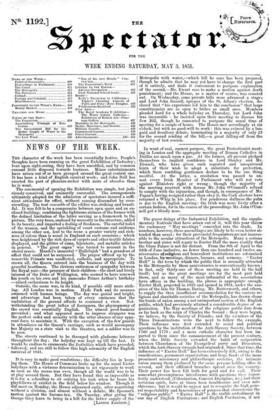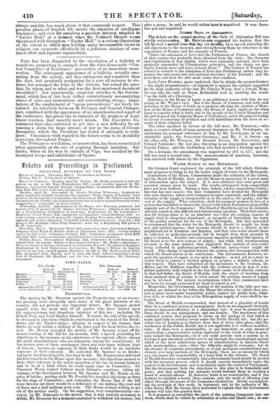The gayer doings of the Industrial Exhibition and the supple-
mentary festivals that have arisen out of it, will this year throw the customnry "May meetings" somewhat into the shade. In numbers, however, these assemblages are likely to be even better at- tended -than usual ; for their provincial frequenters are not inacces- sible to the secular attractions of the Metropolis. Many a serious brother and sister will repair to Exeter Hall the more readily that the Glass Palace is not far distant. From the 9th of April to the 24th of June inclusive, no fewer than one hundred and twelve an- niversaries okseligions and benevolent institutions are solemnized in London, braieetings, dinners, bazaars, and sermons. "Exeter Hall" is the term by which the public that is annually attracted to the Metropolis by these anniversaries is conventionally known : in fact, only thirty-one of these meeting are held in the hall itself; but as the great meetings are for the most part held there, and as many of the most influential of the associations have offices in the building, the phrase is appropriate enough. Exeter Hall, projected in 1825 and opened in 1831, under the aus- pices of the late Sir Thomas Baring, Mr. Butterworth, and others, to supply the then insufficient accommodation for the various re- ligious and charitable societies of the Metropolis, has drawn closer the bonds of union among a not unimportant section of the English public, which had previously attained a considerable degree of or- ganization. The May meetings of the religious public date from as far back as the reign of Charles the Second : they were begun, we believe, by the Society of Friends ; and the members of the Three Denominations were the next to follow the example. Their influence was first extended to social and political questions by the institution of the Anti-Slavery Society, between 1760 and 1770; and a more catholic character has been im- parted to them since the commencement of the present century, when the Bible Society extended the habit of cooperation between Churchmen of the Evangelical party and Dissenters, which the Anti-Slavery struggle had originated. Since that time, the influence of "Exeter Hall" has been extensively felt, owing to the ramifications, permanent organization, and large funds of the more prominent missionary and philanthropic societies, the intimate union among them produced by the same persons holding office in several, and their affiliated branches spread over the country. Their power has been felt both for good and for evil. Their somewhat presumptuous interference with questions they imper- fectly understood, (Colonization, Convict Discipline, 8ce.) and their sectarian spirit, have at times been troublesome and even mis- chievous; but it would be unjust not to recognize the high gene- ral respectability and benevolence of purpose that characterize tho "religious public." "Exeter Hall" is the visible embodiment in our day of English Puritanism ; and English Puritanism, if not always amiable, has much about it that commands respect. This peculiar phasis of -English life merits the attention of intelligent foreigners; and even for ourselves a peculiar interest attaches in "Exeter Hall," at a moment when the National Church seems threatened with disruption. "Exeter nail " is a. curious illustration of the extent to which men holding many incompatible views in religion can cooperate effectively by a judicious mixture of com- bined effort and separate organization.



























